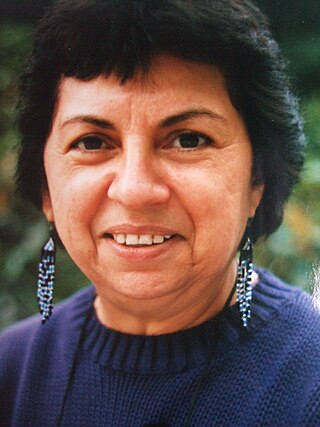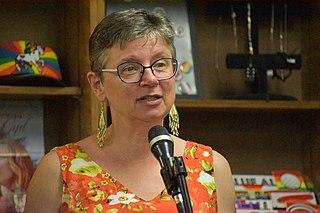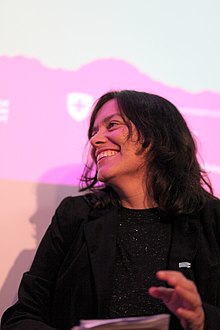
Judith Pamela Butler is an American philosopher and gender studies scholar whose work has influenced political philosophy, ethics, and the fields of third-wave feminism, queer theory, and literary theory.
Queer studies, sexual diversity studies, or LGBT studies is the study of topics relating to sexual orientation and gender identity usually focusing on lesbian, gay, bisexual, transgender, gender dysphoric, asexual, queer, questioning, and intersex people and cultures.
Femme is a term traditionally used to describe a lesbian woman who exhibits a feminine identity or gender presentation. While commonly viewed as a lesbian term, alternate meanings of the word also exist with some non-lesbian individuals using the word, notably some gay men and bisexuals. Some non-binary and transgender individuals also identify as lesbians using this term.

Lesbian feminism is a cultural movement and critical perspective that encourages women to focus their efforts, attentions, relationships, and activities towards their fellow women rather than men, and often advocates lesbianism as the logical result of feminism. Lesbian feminism was most influential in the 1970s and early 1980s, primarily in North America and Western Europe, but began in the late 1960s and arose out of dissatisfaction with the New Left, the Campaign for Homosexual Equality, sexism within the gay liberation movement, and homophobia within popular women's movements at the time. Many of the supporters of Lesbianism were actually women involved in gay liberation who were tired of the sexism and centering of gay men within the community and lesbian women in the mainstream women's movement who were tired of the homophobia involved in it.

Transfeminism, or trans feminism, is a branch of feminism focused on transgender women and informed by transgender studies. Transfeminism focuses on the effects of transmisogyny and patriarchy on trans women. It is related to the broader field of queer theory. The term was popularized by Emi Koyama in The Transfeminist Manifesto.

Cherríe Moraga is a Xicana feminist, writer, activist, poet, essayist, and playwright. She is part of the faculty at the University of California, Santa Barbara in the Department of English since 2017, and in 2022 became a distinguished professor. Moraga is also a founding member of the social justice activist group La Red Xicana Indígena, which is network fighting for education, culture rights, and Indigenous Rights. In 2017, she co-founded, with Celia Herrera Rodríguez, Las Maestras Center for Xicana Indigenous Thought, Art, and Social Practice, located on the campus of UC Santa Barbara.

Gloria Evangelina Anzaldúa was an American scholar of Chicana feminism, cultural theory, and queer theory. She loosely based her best-known book, Borderlands/La Frontera: The New Mestiza (1987), on her life growing up on the Mexico–Texas border and incorporated her lifelong experiences of social and cultural marginalization into her work. She also developed theories about the marginal, in-between, and mixed cultures that develop along borders, including on the concepts of Nepantla, Coyoxaulqui imperative, new tribalism, and spiritual activism. Her other notable publications include This Bridge Called My Back: Writings by Radical Women of Color (1981), co-edited with Cherríe Moraga.

Gayle S. Rubin is an American cultural anthropologist, theorist and activist, best known for her pioneering work in feminist theory and queer studies.

José Esteban Muñoz was a Cuban American academic in the fields of performance studies, visual culture, queer theory, cultural studies, and critical theory. His first book, Disidentifications: Queers of Color and the Performance of Politics (1999) examines the performance, activism, and survival of queer people of color through the optics of performance studies. His second book, Cruising Utopia: the Then and There of Queer Futurity, was published by NYU Press in 2009. Muñoz was Professor in, and former Chair of, the Department of Performance Studies at New York University's Tisch School of the Arts. Muñoz was the recipient of the Duke Endowment Fellowship (1989) and the Penn State University Fellowship (1997). He was also affiliated with the Modern Language Association, American Studies Association, and the College Art Association.
Sue-Ellen Case is Professor and Chair of Critical Studies in the Theatre Department in the School of Theater Film and Television at the University of California, Los Angeles.
Sheila Jeffreys is a former professor of political science at the University of Melbourne, born in England. A lesbian feminist scholar, she analyses the history and politics of human sexuality.
Feminist views on sexuality widely vary. Many feminists, particularly radical feminists, are highly critical of what they see as sexual objectification and sexual exploitation in the media and society. Radical feminists are often opposed to the sex industry, including opposition to prostitution and pornography. Other feminists define themselves as sex-positive feminists and believe that a wide variety of expressions of female sexuality can be empowering to women when they are freely chosen. Some feminists support efforts to reform the sex industry to become less sexist, such as the feminist pornography movement.
The Cultural Politics of Emotion, published in 2004 by Edinburgh University Press and Routledge, is a book by Sara Ahmed focusing on the relationship between emotions, language, and bodies. Ahmed concentrates on the influence of emotions on the body and the ways in which bodies relate with communities, producing social relationships that determine the rhetoric of the nation. The book contributes to the growing conversation about emotion in rhetoric and cultural studies and employs a variety of theories including rhetorical theory, queer theory, feminist theory, Marxist theory, and poststructuralist theory of language.
Transgender studies, also called trans studies or trans* studies, is an interdisciplinary field of academic research dedicated to the study of gender identity, gender expression, and gender embodiment, as well as to the study of various issues of relevance to transgender and gender variant populations. Interdisciplinary subfields of transgender studies include applied transgender studies, transgender history, transgender literature, transgender media studies, transgender anthropology and archaeology, transgender psychology, and transgender health. The research theories within transgender studies focus on cultural presentations, political movements, social organizations and the lived experience of various forms of gender nonconformity. The discipline emerged in the early 1990s in close connection to queer theory. Non-transgender-identified peoples are often also included under the "trans" umbrella for transgender studies, such as intersex people, crossdressers, drag artists, third gender individuals, and genderqueer people.

Allyson Mitchell is a Toronto-based maximalist artist, working predominantly in sculpture, installation and film. Her practice melds feminism and pop culture to trouble contemporary representations of women, sexuality and the body largely through the use of reclaimed textile and abandoned craft. Throughout her career, Mitchell has critiqued socio-historical phobias of femininity, feminine bodies and colonial histories, as well as ventured into topics of consumption under capitalism, queer feelings, queer love, fat being, fatphobia, genital fears and cultural practices. Her work is rooted in a Deep Lez methodology, which merges lesbian feminism with contemporary queer politics.
Carolyn Dinshaw is an American academic and author, who has specialised in issues of gender and sexuality in the medieval context.
Harriet Malinowitz is an American academic scholar specializing in lesbian and gay issues in higher education, women's studies, the rhetoric of Zionism and Israel/Palestine, and writing theory and pedagogy.

Lisa L. Moore is a Canadian-American academic and poet. She earned a B.A. in English with honors at Queen's University in 1986, and then completed her doctorate at Cornell University in 1991. Principal themes in Moore’s work include the centrality of love between women to literary genres such as the novel, the landscape arts, and the sonnet; the transatlantic and multi-racial history of feminist art and thinking; and the importance of poetry to second-wave feminist, womanist, and lesbian cultures and politics.
Ann Luja Cvetkovich is a Professor and former Director of the Feminist Institute of Social Transformation at Carleton University in Ottawa. Until 2019, she was the Ellen Clayton Garwood Centennial Professor of English and Professor of Women's and Gender Studies at the University of Texas at Austin, where she had been the founding director of the LGBTQ Studies Program, launched in 2017. She has published three books: Mixed Feelings: Feminism, Mass Culture, and Victorian Sensationalism (1992); An Archive of Feelings: Trauma, Sexuality, and Lesbian Public Cultures (2003); and Depression: A Public Feeling (2012). She has also co-edited Articulating the Global and Local: Globalization and Cultural Studies (1996) with Douglas Kellner, as well as Political Emotions: New Agendas in Communication (2010) with Janet Staiger and Ann Reynolds. Furthermore, Cvetkovich has co-edited a special issue of Scholar and Feminist Online, entitled "Public Sentiments" with Ann Pellegrini. She is also a former co-editor of GLQ: A Journal of Lesbian and Gay Studies with Annamarie Jagose.

Sister Outsider: Essays and Speeches is a collection of essential essays and speeches written by Audre Lorde, a writer who focuses on the particulars of her identity: Black woman, lesbian, poet, activist, cancer survivor, mother, and feminist. This collection, now considered a classic volume of Lorde's most influential works of non-fiction prose, has had a groundbreaking impact in the development of contemporary feminist theories. In fifteen essays and speeches dating from 1976 to 1984, Lorde explores the complexities of intersectional identity, while explicitly drawing from her personal experiences of oppression to include sexism, heterosexism, racism, homophobia, classism, and ageism. The book examines a broad range of topics, including love, self-love, war, imperialism, police brutality, coalition building, violence against women, Black feminism, and movements towards equality that recognize and embrace differences as a vehicle for change. With meditative conscious reasoning, Lorde explores her misgivings for the widespread marginalization deeply-rooted in the United States' white patriarchal system, all the while, offering messages of hope. The essays in this landmark collection are extensively taught and have become a widespread area of academic analysis. Lorde's philosophical reasoning that recognizes oppressions as complex and interlocking designates her work as a significant contribution to critical social theory.










